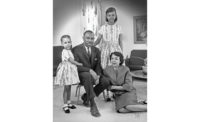As far back as she can remember, Gayle Roberts was always good with numbers.
“In high school I loved math and science,” Roberts says, “I don’t know why but I wasn’t really encouraged to go into it, even though I asked about it.”
When faced with a lack of options, Roberts made a habit of making her own. There weren’t many female chemical engineering majors at Iowa State University in 1976, but she coached and tutored her chemistry dorm mates who weren’t as adept at the material as she was even though she hadn’t yet decided to pursue that major herself.
“I was taking chemistry and calculus and everything as electives,” she says. “When I talk to other women, I say have courage. I didn’t even switch my major until my junior year. There was still that desire to do something, but it took me a little while to get up the courage to do it, just because there just weren’t that many women going into it back then.”
She retired last summer after a 35-year career with Muscatine, Iowa, consulting engineer Stanley Consultants. She led the firm as its president from 2007 to 2012, its CEO from 2012 to 2017 and served as chairwoman of the board until her retirement. Roberts is a shining example of the difference one woman can make in consulting engineering, including growing a business over 10 years at the top, opening new markets in Africa and creating value for shareholders.
“I think a career is more about all the things that we can do in engineering,” she says. “It really does make a difference in the lives of others. Some of our international projects, even our domestic ones. You see things built that just change the lives of people.”
Hired as a junior engineer out of Iowa State, Roberts accepted challenging assignments that no one else wanted.
“You have to raise your hand, new opportunities don’t always come your way,” she says.
Roberts’ predecessor as both president and CEO, Gregs Thomopulos, actually relocated to Africa for several years when the firm worked on projects such as the feasibility study for the reconstruction of the Mount Coffee Dam in war-torn Liberia. Roberts was eager to work on projects there.
“It is kind of interesting, our little company in Muscatine, Iowa, not the first company you would think would go overseas,” Roberts says. “I first started going there in the ’80s when we were working on a new generating plant. There was such a great need for infrastructure. That was really what started our international business. We didn’t have offices in Europe, we just went where the work was.”
Roberts ascended to the role of president in 2007 just before the recession hit the entire consulting engineering industry in 2008. She quickly shifted the company’s plans to ensure that it would survive as an employee-owned company—just as it was when she was hired—and not be gobbled up in the spate of acquisitions that was going on at that time.
“We are a member-owned company, we call our employees members, so we can make decisions for the long term of our company. We have a pretty strong commitment that we want to remain independent, and so that was my drive,” she says. “Through the tough times, the question always was ‘What do I have to do to make sure that we remain strong, we get through this, and we remain independent?’”
Stanley Consultants maintained its independence and came through the downturn a leaner, stronger company. Stanley branched out into new markets such as aviation during Roberts’ tenure and became a major player at Chicago’s O’Hare airport and came out of the recession stronger for it. Stanley ranked 30th on ENR Midwest’s Top Design Firms survey last year.
Throughout, she volunteered her time for industry trade associations to share expertise and promote the work of her fellow engineers.
“Gayle’s service on the executive committee of American Council of Engineering Companies as well as the executive committee of the design professionals coalition has capped a long career wherein she devoted herself not only to superior project execution and corporate development but also to promoting legislation and educational programs that benefit the industry and society at large,” says David Raymond, president and CEO of the ACEC, after Roberts’ two-year term as the ACEC vice chair ended.
Roberts also served on boards at Iowa State University, University of Iowa, St. Ambrose University and Engineers Without Borders USA. Through her efforts to promote women in the engineering profession, Roberts has been recognized with the Athena Award from The Women’s Connection, Upward Mobility Award from the Society of Women Engineers, the Professional Achievement Citation in Engineering (PACE) Award from the Iowa State University Alumni Association, Woman of Influence Award from the Corridor Business Journal, Voice of the Engineer Award from the Iowa Engineering Society, 50% Solution Award from the Iowa Women’s Foundation and an Iowa Women of Innovation Award in the leadership category from the Technology Association of America.
“The quality of leadership that Gayle Roberts provided isn’t just shown by the projects she worked on and what her company did, but how much she gave back to the industry,” said Raj Sheth, chairman of Mead & Hunt, while introducing her at ENR Midwest’s awards breakfast in October, where she received her legacy award.
Now that she has retired, Roberts said she hopes to be able to work more toward the goal of advancing diversity in the design professions.
“I wouldn’t necessarily say we’re at a tipping point, but there’s so much more momentum around diversity now than there ever was before,” she says. “I think there’s a growing awareness and, actually, a strong appetite for stronger diversity. When I say diversity, I’m thinking diversity in the broadest sense. I believe if we take that attitude, that we’re looking for diversity in all backgrounds, then that makes our team stronger. I think we have a long way to go, to be honest, but at least there’s a conversation happening now where it wasn’t before.”
Roberts says she will work in consulting, coaching and management during her retirement. Many engineering firms have already reached out to ask about her availability for their boards. She and her husband own a recreational vehicle and are also enjoying seeing the country and spending time at their vacation home in Colorado.
“Mostly, I’d like to do more in coaching women leaders in our industry as well to help them along,” she says. “I’ve got a little bit of that going, and it hasn’t been that long yet. That is what I plan to do to stay engaged for the near term.”









Post a comment to this article
Report Abusive Comment